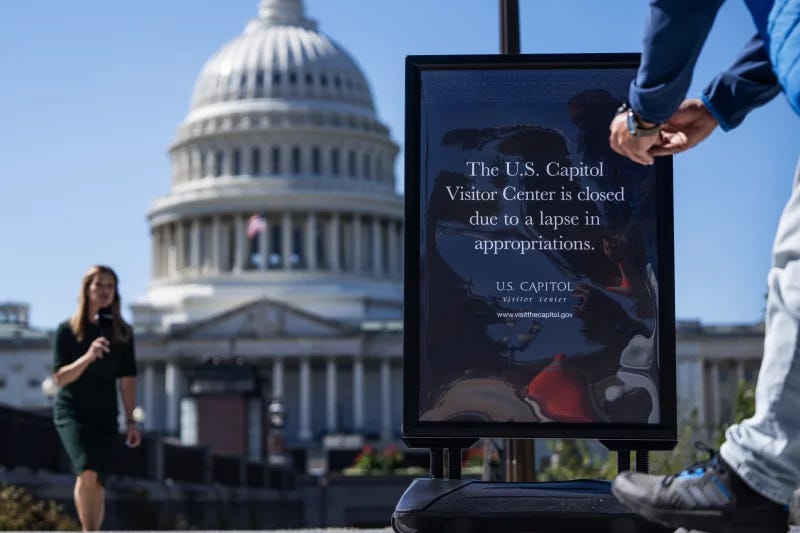How a budget fight shut down more than the government
A story, quote, and lesson about normalized incompetence
Build, don’t break.
Shutdowns aren’t new.
Since the 1980s, the U.S. government has seen over a dozen shutdowns or near-shutdowns, usually sparked by a familiar problem: no agreement on the federal budget. Every year, like clockwork, the threat looms. And every year, we hope it doesn’t come true.
But this first week of October 2025, it finally did.
Over 800,000 federal workers were furloughed or forced to work without pay. Key services, from small business loans to passport processing, froze. Economists estimated billions lost in GDP. Airports slowed, inspections stopped, and federal contractors were laid off across the country. All while Congress pointed fingers, each side blaming the other for the stalemate.

It’s easy to see this as just another chapter in a long book of political dysfunction. But maybe it’s something deeper: a reflection of what happens when the desire to “win” becomes stronger than the desire to work together.
Compromise is supposed to be how democracy works. But somewhere along the way, it’s become a dirty word. Politicians, and even many of us, seem more interested in being right than being effective. We celebrate ideological purity, even when it paralyzes progress. We’ve gotten used to the idea that deadlock is just part of the process.
But it doesn’t have to be.
“Successful negotiation is not about getting to ‘yes’; it’s about mastering ‘no’ and understanding what the path to an agreement is.”
- Chris Voss, American businessman, author, and former FBI hostage negotiator
The 2025 shutdown wasn’t just a failure of Congress. It was a failure of culture. A symptom of how deeply we’ve normalized division, not only in politics, but in everyday life, online, at work, in families, in communities. We draw lines and build walls, forgetting that we live on the same land, share the same future, and, like it or not, need each other to build anything worth keeping.
In that sense, the shutdown is more than a U.S. issue. Around the world, countries are experiencing the same tensions: partisanship, polarization, political gridlock. When disagreement turns into dysfunction, everyone loses.
The answer? Accountability. Not just from elected officials, but from us. We have to reward collaboration, not chaos. We have to make middle ground the goal, not a sign of weakness. We have to remember that the true test of leadership, at any level, isn’t how loudly you can shout, but how well you can listen and build alongside others.
In business, in families, in creative projects, in governments, the work only moves forward when people are willing to meet in the middle.
So now I ask you:
What are you building? And who are you willing to build with, even when you disagree?



Build something worth leaving for the next generation . History is being written, will you be a good actor or actress? Think about it . What consequence will my acción have ? Destroying what we have is sometimes easier than building. Hurting people is always a bad idea.
This is a very important topic to deeply think how we can do things differently on what we control. I think there is a key element in two important aspects.of life: Family and Business. In family we must understand that we love.eachother and there is no second agenda so we must be able to look at what can I give and for sure we will receive back. And this is sometimes hard
In business it is a different story and tough to achieve that kind of teamwork. And we must focus and our mutual collaboration.